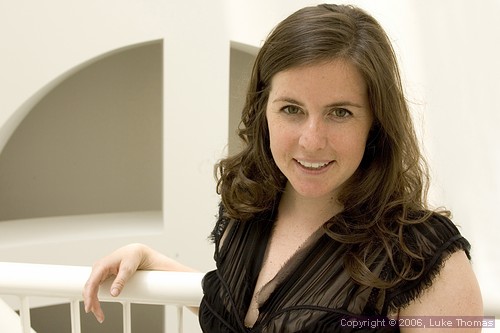WITH JORDANNA THIGPEN

Photo(s) by
Luke Thomas
Local first
By Jordanna Thigpen
June 9, 2006
So, I know I said a few weeks ago that Chicago was the second
best city in America.
And, I do still believe that. But I have to add a qualifier. It
is the second best large city in America. The second best small
city might be Burlington, Vermont.
I am in Burlington for the Business Alliance for Local Living
Economies (BALLE) annual
conference. BALLE aims to promote the creation of sustainable
communities, through the local economy movement, and sees the
business community as the engineer for this process. There are
attendees from 37 states and six foreign countries, including
Australia, Nepal, and Canada. BALLE aims to create networks of
local economies - our own San Francisco Locally Owned Merchants
Alliance started last year.
BALLE's philosophy is to Think Local First - not a mandate, but
a suggestion.
Burlington, the largest city in the state, is an appropriate
venue for the conference. The town's mayor used to be Bernie Sanders,
the only Independent member of the House and a self-proclaimed
"Democratic socialist." The city has a HUD Renewal zone,
providing an incentive for development. There is a thriving downtown
featuring a pedestrian avenue lined with independent, locally
owned merchants interspersed with multinational chain stores,
diversifying the choices and increasing healthy competition. The
downtown would not exist but for Mr. Sanders, who engineered a
lengthy challenge to a mall project to give the pedestrian avenue
time to develop (the mall now evokes a desperate "downtown"
caricature in the spirit of Santana Row.) The downtown grocery
store, a co-operative, features tags alerting consumers to the
source of their food, be it (mostly) local or South American.
Edward Antczak, an Economic Development Specialist with the city's
Community & Economic Development Office, claims that the secret
is the process of local governance. "We have a very fluid
style of management here," he says. "No one ever says
no. If you want to try an idea, you talk to a colleague and you
say, 'Hey, let's go to the mayor with this,' and we try it out."
Burlington's Mayor, Bob Kiss, is a true progressive (true progressives
have held the mayoral seat for twenty-five years in Burlington).
Tonight he told the conference's 500+ attendees that "Business
is the key to social change." How many "progressives"
in San Francisco can see the business community (including the
locally owned business community, our true majority) as anything
more than cigar-chomping Enron executives, ripe for new fees?
Here, the vision is clear: local merchants create local communities
- and local communities are sustainable communities.
What does it mean to create a sustainable community? In the words
of Bill McKibben, acclaimed author of The End of Nature and Wandering
Home, among other works, "Sustainable communities are neither
progressive nor conservative - they are human."
Mr. McKibben was writing about climate change in 1989. He was
the first person to break the news to the global community that
in order to survive, we need to make serious changes in our lifestyles
and in the way that we do business with ourselves. "Local
economies are the cutting edge, the vanguard," Mr. McKibben
states. I interviewed Mr. McKibben after his keynote address and
inquired what best practices he had seen around the country surrounding
the creation of local economies. "The best, most important
idea, is to create local preferences for purchasing," he
says. "For example a school district buys 10% of its food
from local producers, and increases to 15% the next year, and
20% after that. It keeps rising, as demand grows." And as
to claims of protectionism? "I don't worry about protectionism,
because I want my community to be protected."
Well, owing to our (dare I say it?) aging Constitution and volumes
of case law, legislators for local governments have to worry about
protectionism. But moderate steps can be taken for this important
concept: our own Governor Arnold Scharwzenegger recently, thankfully,
revitalized a Davis-era program and mandated that 25% of state
department spending must go to California-based businesses. San
Francisco small business owners have been asking for a similar
law for over ten years and have yet to receive a response. If
the CHP can find a way to spend 25% of its budget in California….
The business community is the key to social transformation. The
local business communities in Burlington, in San Francisco, in
Philadelphia, in Los Angeles can create an economic revolution:
a global network of local economies. With proper leadership and
a bit of luck, San Francisco can be at the forefront of these
changes.
District 6 resident Jordanna Thigpen is an attorney, small
business owner and President of the San Francisco Small Business
Commission. You can usually find her at work and she doesn't get
to Ocean Beach often enough. Email Jordanna at jgthigpen@gmail.com.
####
|